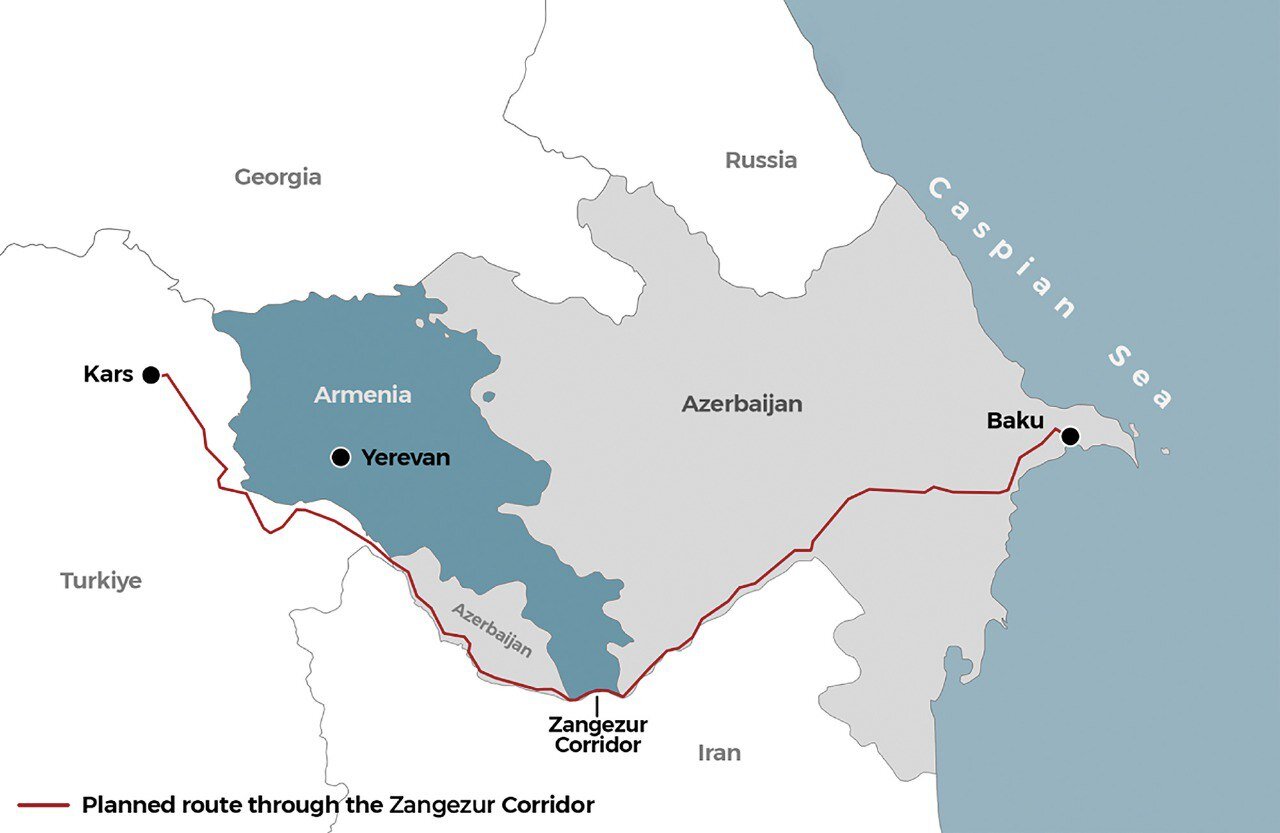Zangezur: The corridor that could break the Caucasus
With Iran’s firm opposition, renewed calls for the illegal route are all but sure to drag region into chaos

TEHRAN – The Republic of Azerbaijan is once again making a splash with its infamous corridor proposal, this time dragging the United States and NATO into the saga after it was forced to scrap its plans last year when Iranian forces amassed the border with Armenia.
Azerbaijan’s proposed "Zangezur corridor" is more than just a transit route. The plan aims to link the country’s mainland to the Nakhchivan exclave – a connection already secured via Iran – with a new route slicing through Armenia. However, unlike the existing route through Iran, Baku seeks control over this new corridor, which means that it would ultimately shatter Armenia’s sovereignty in its southern Syunik province and alter the country’s historical borders with Iran, if the Zangezur project is realized.
Azeri President Elham Aliyev and his Turkish patron Recep Tayyip Erdogan began to float the idea after a 2020 war that saw Baku regain control of significant portions of the Nagorno-Karabakh region, as well as the surrounding territories that had been held by Armenian forces as a buffer zone since the 1990s. The peace agreement signed at the conclusion of the war included a provision for new transport routes connecting mainland Azerbaijan to Nakhchivan, but it did not grant Azerbaijan control over internationally-recognized Armenian territory.
The two presidents frequently spoke about the corridor during 2023 and 2024, even getting Russia to announce an apparent lack of opposition at one point. But they decided they could not make the Zangezur happen after Iranian forces and equipment began to gather at the border with Armenia, according to information obtained by the Tehran Times.
It appears, however, that Baku and Ankara are testing new ways to materialize their plans. Last month, U.S. Ambassador to Turkey Tom Barrack announced Washington's offer to build and manage the Zangezur in an attempt to “advance” negotiations in the South Caucasus. Aliyev seemed to gain new boldness after that, declaring at a media forum earlier this month that he will accept “no reciprocal arrangement” on the matter.
Aliyev, who has been the president since 2003 after replacing his father, is looking to leverage shifting regional and global dynamics to advance the Zangezur project, stated Hossein Salar Seyfodini, a researcher and expert on the South Caucasus region. “Baku recognizes Iran’s firm opposition and aims to avoid direct conflict with Tehran,” he stated. “Therefore, it is trying to involve various international players including Israel, Britain, the U.S. and NATO to raise the stakes and deter Iran’s potential political and military intervention in the matter.”
The statements by American and Azeri figures in recent weeks have already alarmed Iranians. During a Monday presser, Iran’s Foreign Ministry spokesman reiterated Iran’s position that any transport routes connecting mainland Azerbaijan to Nakhchivan must respect regional countries’ “national sovereignty” and “territorial integrity”. “Tehran is closely monitoring this issue as it relates to the country’s national interests,” the spokesman added.
A day earlier, Ali Akbar Velayati, a senior advisor to the Leader of the Islamic Revolution, delivered the strongest condemnation of the Zangezur proposal to date. He said the corridor, rather than fostering connections and advancing economic projects, aims to weaken Iran's position in the South Caucasus, impose a land blockade on Iran and Russia, and ultimately incite separatism within Iran.
It appears that a military confrontation would be unavoidable should Azerbaijan, Turkey, and the U.S. persist in pursuing these plans. In his statement, Velayati indicated that Tehran has redeployed forces to the border and intends to pursue a policy of "active prevention" rather than reactive measures.
In the event of a military confrontation, Tehran may also retaliate for Azerbaijan's reported involvement in Israel's 12-day war against Iran, which occurred between June 13 and June 24. Citizens living near the Iran-Azerbaijan border have reported witnessing drones entering Iran from Azerbaijan. While Baku has denied these reports, Iran has stated it is investigating the matter.
Furthermore, an encroachment on Armenian territory would add another legal challenge to Aliyev's existing list of concerns, Seyfodini stated. Azerbaijan already faces accusations of war crimes committed during the conflicts over the Nagorno-Karabakh region, with at least two complaints filed at the International Criminal Court (ICC) by rights groups representing Armenian victims.
Leave a Comment